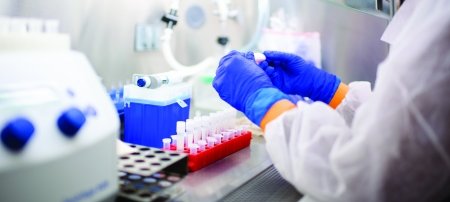The recently opened Michigan Tech Sleep Research Laboratory combines sleep analysis technologies to provide a window into the effects of sleep on cardiovascular health.
The two-bed sleep study facility is located in Michigan Tech University’s Student Development Complex and has a core staff of two faculty researchers, a sleep physician, a registered nurse who is also a certified sleep technician, a lead doctoral student researcher, as well as other graduate students and undergraduate students.
Studies at the facility hinge on research into the effects of sleep on cardiovascular health, contributing to the broader field of sleep research—a field that is growing rapidly.
“What implication does sleep have? We sleep one-third of our lives. It’s a huge chunk of our days,” says Jason Carter, associate vice president for research development and professor of kinesiology and integrative physiology. “An elephant only sleeps three hours a day, while a lion sleeps up to 20 hours day. We see a huge species variation in sleep, but we still don’t fully understand what sleep does.”
Both of the sleep rooms in the new facility not only have the capabilities of the overnight polysomnography (PSG) and electroencephalography (EEG), but also take simultaneous measurements of beat-by-beat blood pressure through finger plethysmography, which constantly records blood pressure throughout the night; pulse oximetry, which measures oxygen content in the blood throughout the night; and transcutaneous carbon dioxide levels from the skin.
The facility meets all of the physical requirements to seek a sleep study center accreditation from the American Academy of Sleep Medicine. Additionally, researchers are working with sleep study software company Natus to add blood pressure readings to its suite of monitored biometric signals. Perhaps most cutting edge, is the team’s interdisciplinary approach to sleep research that includes biomedical engineering signal processing techniques applied to physiology. In the future, the Michigan Tech Sleep Research Laboratory plans to prove the importance of Big Data in the field of sleep research.
“We’re using these technologies in novel combinations to better understand the impact of things like alcohol, sleep deprivation and insomnia on blood pressure,” Carter says. “There’s a very complex relationship between sleep and blood pressure control. The epidemiological evidence is clear these are strongly coupled, and they seem to be more strongly coupled in women than men.”
Current research at the center focuses on several separate studies:
- National Institutes of Alcohol Abuse and Alcoholism (NIAAA)-funded study to understand alcohol’s effects on sleep, blood pressure and brain activity
- National Heart, Lung and Blood Institute (NHLBI)-funded study to compare cardiovascular responses to sleep deprivation in postmenopausal women and men of similar ages
- Effects on insomnia on cardiovascular health
“What’s unique for us is the ability to combine various technologies that have been developed in human physiological signal processing,” Carter says. “The real-world applicability and emphasis is to ultimately inform and educate the public on how we might avoid or slow down the risk for cardiovascular disease as it pertains to sleep insufficiencies.”

Michigan Technological University is an R1 public research university founded in 1885 in Houghton, and is home to nearly 7,500 students from more than 60 countries around the world. Consistently ranked among the best universities in the country for return on investment, Michigan's flagship technological university offers more than 185 undergraduate and graduate degree programs in science and technology, engineering, computing, forestry, business, health professions, humanities, mathematics, social sciences, and the arts. The rural campus is situated just miles from Lake Superior in Michigan's Upper Peninsula, offering year-round opportunities for outdoor adventure.







Comments